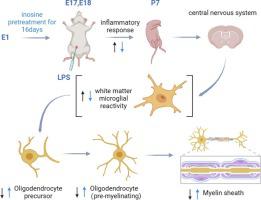当前位置:
X-MOL 学术
›
Brain Res.
›
论文详情
Our official English website, www.x-mol.net, welcomes your feedback! (Note: you will need to create a separate account there.)
Inosine pretreatment of pregnant rats ameliorates maternal inflammation-mediated hypomyelination in pups via microglia polarization switch
Brain Research ( IF 2.9 ) Pub Date : 2024-03-01 , DOI: 10.1016/j.brainres.2024.148844 Yong Han , Jinping Sun , Xiaojuan , Ma·Xin Li , Quanrui Ma
Brain Research ( IF 2.9 ) Pub Date : 2024-03-01 , DOI: 10.1016/j.brainres.2024.148844 Yong Han , Jinping Sun , Xiaojuan , Ma·Xin Li , Quanrui Ma

|
Periventricular leukomalacia (PVL) is a neurological condition observed in premature infants, characterized by hypomyelination and activation of microglia. Maternal inflammation-induced brain injury in offspring significantly contributes to the development of PVL. Currently, there are no clinical pharmaceutical interventions available for pregnant women to prevent maternal inflammation-mediated brain injury in their offspring. Inosine has been shown to modulate the immune response in diverse stressful circumstances, such as injury, ischemia, and inflammation. The aim of this investigation was to examine the potential prophylactic impact of inosine on offspring PVL induced by maternal inflammation. This was accomplished by administering a 1 mg/ml inosine solution (40 ml daily) to pregnant Sprague-Dawley (SD) rats for 16 consecutive days prior to their intraperitoneal injection of lipopolysaccharide (350 µg/kg, once a day, for two days). The results showed that maternal inosine pretreatment significantly reversed the reduction in MBP and CNPase (myelin-related markers), CC-1 and Olig2 (oligodendrocyte-related markers) in their PVL pups (P7), suggesting that inosine administration during pregnancy could improve hypomyelination and enhance the differentiation of oligodendrocyte precursor cells (OPCs) in their PVL pups. Furthermore, the protective mechanism of inosine against PVL is closely associated with the activation and polarization of microglia. This is evidenced by a notable reduction in the quantity of IBA 1-positive microglia, a decrease in the level of CD86 (a marker for M1 microglia), an increase in the level of Arg 1 (a marker for M2 microglia), as well as a decrease in the level of pro-inflammatory factors TNF-α, IL-1β, and IL-6, and an increase in the level of anti-inflammatory factors IL-4 and IL-10 in the brain of PVL pups following maternal inosine pretreatment. Taken together, inosine pretreatment of pregnant rats can improve hypomyelination in their PVL offspring by triggering the M1/M2 switch of microglia.
中文翻译:

肌苷预处理怀孕大鼠通过小胶质细胞极化开关改善母体炎症介导的幼鼠髓鞘形成不足
脑室周围白质软化症 (PVL) 是早产儿中观察到的一种神经系统疾病,其特征是髓鞘形成不足和小胶质细胞激活。母体炎症引起的后代脑损伤显着促进 PVL 的发展。目前,尚无适用于孕妇的临床药物干预措施来预防母体炎症介导的后代脑损伤。肌苷已被证明可以在多种应激环境下调节免疫反应,例如损伤、缺血和炎症。本研究的目的是探讨肌苷对母体炎症引起的后代 PVL 的潜在预防作用。这是通过给怀孕的 Sprague-Dawley (SD) 大鼠连续 16 天注射 1 mg/ml 肌苷溶液(每天 40 ml),然后腹腔注射脂多糖(350 µg/kg,每天一次,持续两天)来实现的。 )。结果显示,母体肌苷预处理显着逆转了 PVL 幼仔 (P7) 中 MBP 和 CNPase(髓磷脂相关标记物)、CC-1 和 Olig2(少突胶质细胞相关标记物)的降低,这表明怀孕期间施用肌苷可以改善髓鞘形成不足并增强 PVL 幼崽中少突胶质细胞前体细胞 (OPC) 的分化。此外,肌苷对PVL的保护机制与小胶质细胞的激活和极化密切相关。 IBA 1 阳性小胶质细胞数量显着减少、CD86(M1 小胶质细胞标记物)水平降低、Arg 1(M2 小胶质细胞标记物)水平增加以及母体喂养后,PVL 幼仔大脑中促炎因子 TNF-α、IL-1β 和 IL-6 水平降低,抗炎因子 IL-4 和 IL-10 水平升高肌苷预处理。综上所述,对怀孕大鼠进行肌苷预处理可以通过触发小胶质细胞的 M1/M2 转换来改善其子代 PVL 的髓鞘形成不足。
更新日期:2024-03-01
中文翻译:

肌苷预处理怀孕大鼠通过小胶质细胞极化开关改善母体炎症介导的幼鼠髓鞘形成不足
脑室周围白质软化症 (PVL) 是早产儿中观察到的一种神经系统疾病,其特征是髓鞘形成不足和小胶质细胞激活。母体炎症引起的后代脑损伤显着促进 PVL 的发展。目前,尚无适用于孕妇的临床药物干预措施来预防母体炎症介导的后代脑损伤。肌苷已被证明可以在多种应激环境下调节免疫反应,例如损伤、缺血和炎症。本研究的目的是探讨肌苷对母体炎症引起的后代 PVL 的潜在预防作用。这是通过给怀孕的 Sprague-Dawley (SD) 大鼠连续 16 天注射 1 mg/ml 肌苷溶液(每天 40 ml),然后腹腔注射脂多糖(350 µg/kg,每天一次,持续两天)来实现的。 )。结果显示,母体肌苷预处理显着逆转了 PVL 幼仔 (P7) 中 MBP 和 CNPase(髓磷脂相关标记物)、CC-1 和 Olig2(少突胶质细胞相关标记物)的降低,这表明怀孕期间施用肌苷可以改善髓鞘形成不足并增强 PVL 幼崽中少突胶质细胞前体细胞 (OPC) 的分化。此外,肌苷对PVL的保护机制与小胶质细胞的激活和极化密切相关。 IBA 1 阳性小胶质细胞数量显着减少、CD86(M1 小胶质细胞标记物)水平降低、Arg 1(M2 小胶质细胞标记物)水平增加以及母体喂养后,PVL 幼仔大脑中促炎因子 TNF-α、IL-1β 和 IL-6 水平降低,抗炎因子 IL-4 和 IL-10 水平升高肌苷预处理。综上所述,对怀孕大鼠进行肌苷预处理可以通过触发小胶质细胞的 M1/M2 转换来改善其子代 PVL 的髓鞘形成不足。



























 京公网安备 11010802027423号
京公网安备 11010802027423号